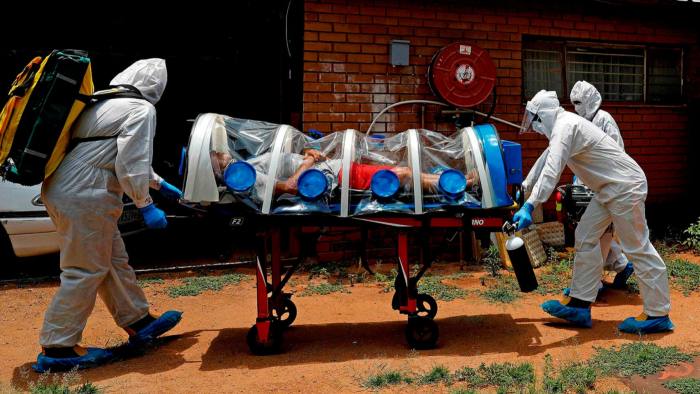
Africa’s Covid-19 Death Rate Highest In the World – WHO
Africa has the highest rate of people killed by Covid-19 in the world so far, the World Health Organisation warns.
The WHO said the case fatality rate remains high due to the many deaths from the previous waves in 2020 and last year when the region had few ICU beds and insufficient oxygen setup.
WHO said although the case fatality rate during the Omicron wave in Africa is extremely low at 0.68, in the last waves was above 2.4 per cent.
“The African region’s current case fatality ratio remains the highest in the world, although it has been lowered in the last two waves,” WHO said in a statement.
“While improvements have been made in the availability of Intensive Care Unit (ICU) beds for Covid-19 patients from 0.8 per 100 000 population to 2.0 per 100 000, the numbers are still far from sufficient to meet the demands of the pandemic.”
Case fatality rate is the estimated number of deaths to date divided by the estimated total number of confirmed infected cases to date.
It is different from a disease’s mortality rate, which is simply the risk of dying of certain disease and is arrived at by dividing the number of deaths by the population at risk during a certain time frame.
In Kenya, the overall case-fatality ratio is 1.72 per cent, from 5,520 deaths and 319,379 total confirmed cases.
Health CS Mutahi Kagwe on Thursday said positivity rate has dropped from 37 per cent in December to the current 6.1 per cent.
“The cumulative fatalities remain 5, 520,” Kagwe said. “A total of 865 patients are currently admitted in various health facilities countrywide.”
Last week, pathologist Ahmed Kalebi, who has been monitoring the trajectory, said he is optimistic the fifth wave in Kenya is over.
“Even though new daily caseload and positivity rate are on the decline, hospitalisation and deaths which lag behind the new infections will continue to rise for a while. Fortunately, ICU admissions have plateaued. Overall we can be optimistic that the Omicron fifth wave is on the downturn,” he said.
Kenya saw its numbers rise dramatically beginning mid-December. Scientists at the Kenya Medical Research Institute who performed genetic sequencing detected the new, highly transmissible Omicron variant on December 15.
Then CS Kagwe on December 19 announced the Omicron variant was now dominant in Kenya.
In a statement on Thursday, WHO said weekly cases across Africa dropped significantly and deaths dipped for the first time this week since the wave began last month.
The decline nudges the continent past its shortest upsurge yet that lasted 56 days.
Newly reported cases fell by 20 per cent in the week to January 16, while deaths dropped by eight per cent.
The decrease in deaths is still small and further monitoring is needed, but if the trend continues the surge in deaths will also be the shortest reported so far during this pandemic, WHO said.
South Africa—where Omicron was first sequenced, and which has accounted for the bulk of cases and deaths—has recorded a downward trend over the past four weeks.
Only North Africa reported an increase in cases over the past week, with a 55 per cent spike. Cases fell across the rest of Africa, where, as of January 16, there were 10.4 million cumulative Covid-19 cases and more than 233 000 deaths.
“While the acceleration, peak and decline of this wave have been unmatched, its impact has been moderate, and Africa is emerging with fewer deaths and lower hospitalizations. But the continent has yet to turn the tables on this pandemic,” said Dr Matshidiso Moeti, WHO Regional Director for Africa.
“So long as the virus continues to circulate, further pandemic waves are inevitable. Africa must not only broaden vaccinations, but also gain increased and equitable access to critical COVID-19 therapeutics to save lives and effectively combat this pandemic,” Dr Moeti said.
Last week, WHO recommended two new drugs—a rheumatoid arthritis drug called baricitinib and a monoclonal antibody called sotrovimab—raising the number of WHO approved Covid-19 therapeutics to 11.
“The deep inequity that left Africa at the back of the queue for vaccines must not be repeated with life-saving treatments. Universal access to diagnostics, vaccines and therapeutics will pave the shortest path to the end of this pandemic and no region of the world should be left on the fringes of this endeavour,” said Dr Moeti.
In Africa, while vaccine supplies have been on the rise in recent months, the rate of vaccination remains low, with just 10 per cent of the continent’s population fully vaccinated.
In Kenya, 59 per cent of all adults above 18 years have received at least one vaccine dose.
Only 18.1 per cent of all adults have been fully vaccinated, the Ministry of Health says.
Africa has so far received about 500 million Covid-19 vaccine doses and administered 327 million.
Briefing journalists this week, WHO chief Tedros Ghebreyesus said Omicron may be less severe, but for the WHO chief “the narrative that it is mild disease is misleading, hurts the overall response and costs more lives.”
Tedros noted that the virus is circulating “far too intensely with many still vulnerable” and argued that, for many countries, the next few weeks remain critical.

